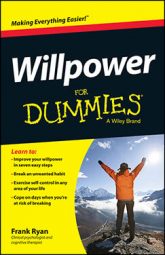Pessimistic thinking styles are closely linked to low self-confidence and low self-esteem. Low self-esteem is a generalised type of low self-worth, based on a perception of consistent, cumulative failure or inadequacy.
Low self-confidence and low self-esteem lead to negative predictions about specific performance or capability, such as, ‘I’m sure I can’t get the job done,’ and to general beliefs about your competency and worth, such as, ‘I’m just not very competent.’
Disempowering pessimism
Negative beliefs can induce a pessimistic outlook that renders willpower irrelevant. After all, if you doubt your capability, you see little point in trying to do anything that may require willpower. Lacking confidence in yourself means that you waste the precious resource of willpower. On the other hand, if you can raise your level of confidence, your willpower can flourish.
The best way to exercise your willpower is by recognising what’s important to express or achieve in any given situation, and deploying your willpower efficiently to that end.
Low self-confidence is also implicated in maintaining a state of learned helplessness. Negative expectations about your ability to cope or perform – for example, harbouring thoughts such as, ‘I won’t succeed, so I won’t bother trying’ or ‘It’s pointless’ – obviously act as a barrier to progress. These beliefs can become self-fulfilling prophecies and trap you in a vicious circle.
In extremes, this type of pathological passivity resembles depression – the ultimate manifestation of hopelessness and apathy. More specifically, this mindset renders willpower redundant. After all, if you feel incapable of initiating action in pursuit of a personally relevant goal, you don’t need willpower.
Even if you’re feeling helpless, don’t quit trying. You can lose your ‘willpower fitness’ as surely as the athlete who doesn’t train for several weeks then gets breathless after running a few hundred metres. You should at least make an effort. Even if you don’t succeed, you have at least learned something and exercised your willpower.
Boosting your self-confidence
You can train yourself to be self-confident.
Modelling – imitating someone else – is one of the most prevalent learning techniques. You pick up a huge range of behaviours through modelling – think of a little girl tottering around in her mummy’s shoes or a little boy shoving his hands in his pockets and shrugging his shoulders just like his dad.
Watching somebody, perhaps a person you admire and identify with, achieve what you want to accomplish can give you pointers on how to accomplish your own goals. The person need not be a personal friend: it may be a movie actor or comedian who bravely and publicly announced some problem or frailty, signalling that it’s okay to be seen as vulnerable. Modelling is how most people learn how to do skilled jobs with confidence (although it’s surely unfair to cite the trainee doctor’s approach to medical procedures: see one, do one, teach one!).
In order to appear more confident when speaking to others, begin your sentences with ‘I’ rather than ‘you’. For example, saying ‘I’m frustrated that you’re often late’ is more direct than ‘You frustrate me when you’re late.’ The second sentence sounds more accusing or even confrontational. It invites a more defensive, ‘Well, I’m sorry you’re frustrated, I’m just very busy these days!’ or ‘That’s your problem, get over it,’ rather than ‘I didn’t realise you felt that way.’ The point is if you say, ‘I feel frustrated’ the other person can’t easily discount your feelings. As a result, punctuality is more likely in the long run, as is the survival of the friendship!
If you’re unsure about committing to do something that may prove daunting, think of a good role model who has accomplished the task. It may be your favourite teacher who inspired you to give a good presentation, or the daytime television presenter who successfully quit smoking. By borrowing some of their self-confidence, you can boost your own – and your willpower as well.
Don’t confuse confidence with dominance. Confidence is about being true to yourself and your values. Confidence is not about imposing your will and getting your own way. Confident people tend to listen more than they speak, know the value of compromise and admit their mistakes. (Covering up mistakes burns up willpower, because your brain has to use precious energy to cloak errors.)

